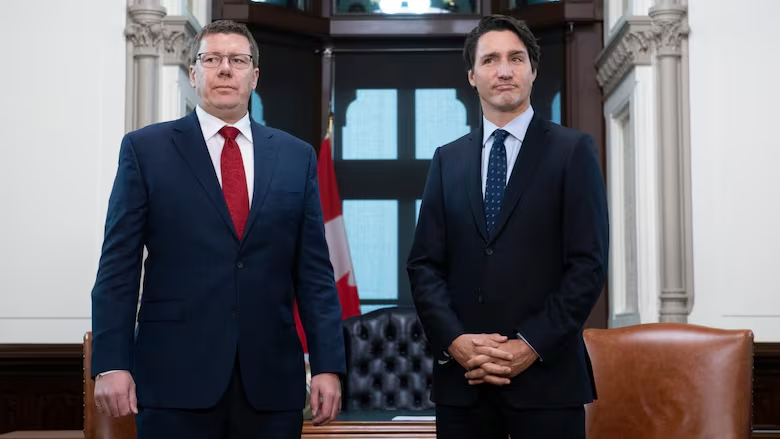Sask. premier calls for immediate federal election after Trudeau's resignation announcement
Trudeau announced Monday he would step down after Liberals find new leader

Saskatchewan Premier Scott Moe says there should be a federal election right away in the wake of Prime Minister Justin Trudeau's announcement that he will be stepping down.
"I reiterate my call for an immediate election so that Canadians may choose who will represent them," Moe said in a statement released Tuesday morning.
Trudeau announced Monday morning that he will resign once the Liberal Party has chosen a successor. Gov. Gen. Mary Simon also agreed to prorogue Parliament until March 24.
"Suspending Parliament to take months to settle who will lead the Liberal party is not giving Canadians the choice they desire or deserve," Moe's statement said.
Experts say Trudeau's decision could lead to a change in the relationship between Saskatchewan and the federal government.
Jim Farney, the director of the Johnson Shoyama Graduate School of Public Policy at the University of Regina, said on CBC's Blue Sky Monday that some degree of change is a certainty.
"There will be a bunch of changes, I think, regardless of who's sitting in the prime minister's chair," Farney said.
Moe has long used Trudeau as a political foil, picking fights over federal carbon pricing and the implementation of clean energy regulations, among other things.
In recent months, Moe has repeatedly called for a federal election and labelled the confidence-and-supply agreement between the Liberals and the NDP as a Liberal-NDP coalition government.
Charles Smith, a professor of political science at the University of Saskatchewan, said Trudeau's departure may make no difference at all.
"I think that on one level it's going to be hard for [Moe]. On the other hand, the policies remain and the Liberal government still is not very popular in Saskatchewan," Smith said.
"So I think that that alone will allow the premier to be able to challenge Ottawa. I actually think it's harder for Scott Moe to do that if there's a [Pierre] Poilievre government in Ottawa."
Farney said the Liberals under Trudeau have been an activist federal government that is "pretty assertive" about using federal spending powers to assist other levels of government.
That includes bypassing provincial governments and going directly to municipalities, such as when it provided money to address homelessness.
"So we've seen the pushback at that from the provinces," Farney said.
That approach could change with a new Liberal leader in charge, he said.
Moe says focus remains on Sask. people
Moe did not touch on the future of his government's relationship with Ottawa in his statement.
"Your Saskatchewan government will continue to work on solutions for Saskatchewan people," Moe said.
"We are focused on addressing affordability, engaging on increased market access, investment attraction and continuing to engage with the U.S. on ensuring border security for those that live on either side of the border."
Saskatchewan NDP Leader Carla Beck issued a statement on Monday describing the events in Ottawa as "political games."
Beck expressed frustration that the chaos in federal politics would continue to distract from the more important issue of dealing with the potential threat of a 25 per cent tariff from incoming United States President Donald Trump.
Beck offered a measure of support for Moe, saying her Official Opposition will help protect Saskatchewan's economy and future.
"We must put aside partisan interests and focus on our province," Beck said.
Chief Bobby Cameron of the Federation of Sovereign Indigenous Nations (FSIN) said he was not surprised by Trudeau's announcement and that it was "just a matter of when."
Cameron said being prime minister is a tough job and there's no way to please everyone, but expressed frustration that Trudeau's decision could delay other government business. Cameron highlighted the unclear future of a settlement agreement on the long-term reform of First Nations child and family services.
A resolution to fully accept a settlement agreement for $47.8 billion was voted down during an Assembly of First Nations meeting in October.
"It just put everybody at a standstill," Cameron said.
He stressed that the FSIN's goal will always be the promotion and protection of the inherent and treaty rights of First Nations. That work will continue regardless of who is prime minister, Cameron said.
Residents react
Residents in Regina offered a mix of opinions when asked about Trudeau's decision on Monday.
Many, including Greg Wensel, said it was probably time for Trudeau to go.
Wensel described Trudeau as a good prime minister who developed beneficial social programs, such as $10-a-day childcare and the Canadian Dental Care Plan.
"I think the Conservatives are going to be pretty tough to beat, but I think it'll be a different game now [that Trudeau is gone]," said Wensel.
Rick Bates said Trudeau's decision will give a Moe a chance to change his tone.
"It hasn't been helpful for our premier to just be negative on every single thing. [It] has led to many lost opportunities for Saskatchewan," said Bates.


